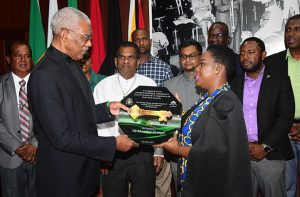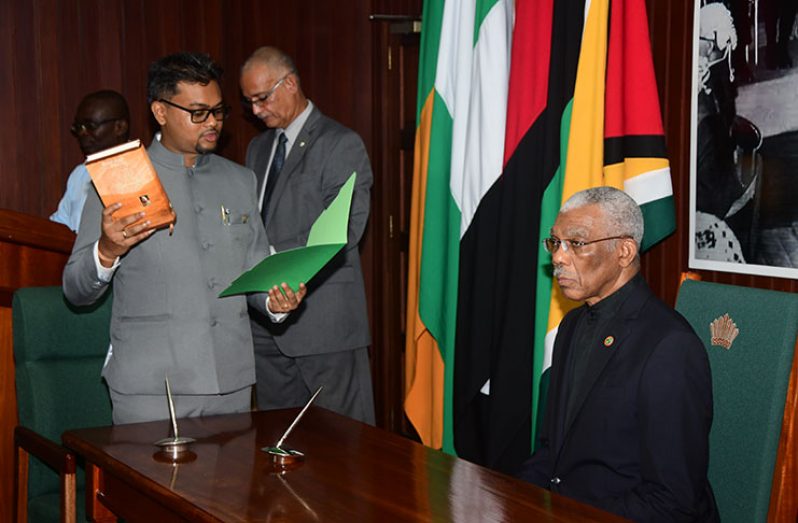– Pres. Granger urges Mayors, Deputy Mayors during swearing-in ceremony
By Svetlana Marshall
AT A time when there continues to be a struggle for power and stagnation in some municipalities and regions, President David Granger on Monday challenged Mayors and their Deputies to recognise their responsibilities to serve their constituents, regardless of political affiliation.
He also noted that the time is ripe for them to lead the process of transforming their towns into centres of commerce and industry.
The President made the foregoing observations after administering the Oath of Office to the re-elected Mayors and Deputy Mayors for the 10 Municipalities, during a simple ceremony held at the Ministry of the Presidency.
Among officials present at the function were Minister of Communities Ronald Bulkan; Minister of State Dawn Hastings-Williams; Director-General of the Ministry of the Presidency Joseph Harmon; and Permanent Secretary in the Ministry of Communities Emil McGarrell.

Underscoring the important roles municipalities play in the Local Government System, President Granger said that Councils, in addition to offering municipal services, must become agents of change, drivers of development, and protectors of the environment, in collaboration with Central Government and the Regional Administrations.
“The Government of Guyana functions in three levels: National, Regional and Local,” Presuident Granger said. “All three levels must collaborate to ensure the efficient delivery of public services to every citizen, everywhere in the country,” he told the elected local leaders.
Noting also that as main centres of commerce and industry, principal terminals of trade, administers of public services, and main settlements of the regional populations, municipalities cannot afford to be affected by political interference, President Granger said:
“Government’s policy of regionalisation over the last four-and-a-half years has been aimed at ensuring a nation of strong regions. This policy strengthens the role of capital towns in regional development.
Town Councils consistent with this policy should continuously revamp and retool their administrative systems to enable them to become engines of enterprise, agents of employment and engines of economic development.”
Cognisant of the challenges on the ground, the Head of State added that “regional councilors, regardless of their political affiliation, must collaborate for the common good of their municipalities and their regions.”
NON-COOPERATIVE STANCE
In some regions, there have been reports that regional chairmen and councillors have taken a non-cooperative stance, resulting in developmental setbacks, particularly after the No-Confidence Motion was moved against the Government in the National Assembly last December. There have also been similar reports in some municipalities.
As opposed to the colonial system, which involved the management of the three counties, Essequibo, Demerara and Berbice by appointed district commissioners, the Regional Administrative System includes democratically-elected Town Councils, Neighbourhood Democratic Councils and Village Councils, and these councils, must at all times act in the interest of the citizenry, the President emphasised.
It was under the current administration that Local Democracy was restored in Guyana after a 22-year hiatus. And in keeping with its 2015 Campaign Manifesto, the A Partnership for National Unity + Alliance for Change (APNU+AFC) Government facilitated Local Government Elections on March 18, 2016, one year after it had taken office. Then, on November 12, 2018, another round of Local Government Elections was held, President Granger said.
“Two Local Government Elections have been held in four years. These elections have restored and renewed local democracy as it should be. These elections allowed citizens to elect their representatives to manage their municipalities and Neighbourhood Democratic Councils. Regular municipal and mayoral elections ensure that councils are accountable and remain accountable to their citizens,” the President pointed out.
STRENGTHENING OF INTERNAL DEMOCRACY
The Municipal and District Councils Act provides for the strengthening of internal democracy by requiring regular elections within councils for the positions of Mayor and Deputy Mayor.

“Mayors and Deputy Mayors are vital to the entire system of governance. They are required to commit to ensuring the delivery of public services within their municipalities and to act in the interest of their constituents. They are required to consult their constituents and citizens in the decision-making processes, which are likely to affect their well-being. They are required to conduct their duties at all times in accordance with the Constitution and the Laws of Guyana, and remain faithful to their oath of Office,” the Head of State told the elected local leaders.
Article 71 of the Constitution of Guyana states that Local government is a vital aspect of democracy, and shall be organised so as to involve as many persons as possible in the task of managing and developing the communities in which they reside.
SWORN IN
The Mayors who were sworn in on Monday are: Ubraj Narine (Georgetown); Winston Roberts (Corriverton); Waneka Arrindell (Linden); Chattergoon Ramnauth (Rose Hall); Rajendra Prabhulall (Anna Regina); Gifford Marshall (Bartica); Chris Phang (Mabaruma); John Macedo (Lethem); and David Adams (Mahdia). As the Mayor of New Amsterdam, Winifred Heywood is currently out of the jurisdiction, she would be sworn in at a later date.
The Deputy Mayors who took the Oath of Office are: Alfred Mentore (Georgetown); Wainwright McIntosh (New Amsterdam); Imran Amin (Corriverton); Wainwright Bethune (Linden); Deonauth Harrinarine (Rose Hall); Rudolph Williams (Anna Regina); Carolyn Robinson (Mabaruma); Debra King (Lethem); and Juewayne Mendonca- Burrowes (Mahdia).
While Local Government Elections are held every three years, internal elections are held annually for mayors and deputy Mayors.





.jpg)








